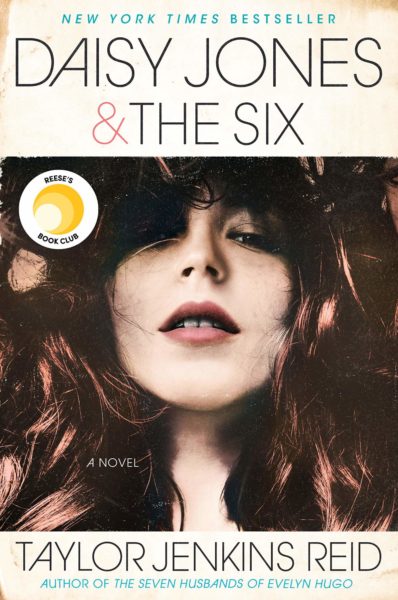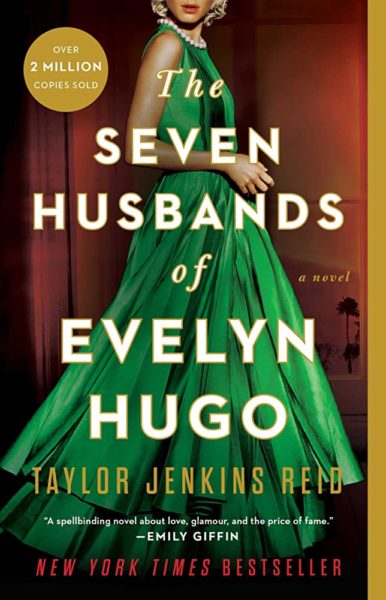There is nothing like Hollywood or Sunset Strip drama in a summer read. Taylor Jenkins Reid pulls it off in her remarkably similar yet still quite interesting books The Seven Husbands of Evelyn Hugo and Daisy Jones and The Six. Having read both books within weeks of each other, I was struck by the similarities in Reid’s preferred frame (the interview), suspense devices, and characters—and by the fact that Reid kept my attention in both books regardless.
Reid crafts both novels by offering a glimpse of gold. With Evelyn Hugo, she reveals that the 79-year-old titular actress’ decision to have her biography written by Monique Grant, a journalist she has never met, is in fact intentional. With Daisy Jones, she tells you a band breaks up only to start with how they first met. The trick to both novels is the puzzling piece of information Reid dangles to keep one reading for an explanation.
A more obvious similarity lies in the format: Reid loves the interview. Evelyn Hugo displays this less formally, with dialogue between Monique, as protagonist, and Evelyn, her interviewee, and exposition regarding other aspects of Monique’s life. Daisy Jones, however, is built from interview transcripts, even at times including brackets one would use to specify a quotation. Reid creates sections in both books, organized by husbands and tours, albums, or years respectively.

Despite the remarkably similar structure of the books, Reid does an admirable job individualizing the two homogenous stories. Her emphasis on sexuality and sexual orientation in Evelyn Hugo strays from her discussion on drug abuse and rehab in Daisy Jones. Ultimately, Evelyn Hugo is the more powerful book. Whereas the character Evelyn has firm direction for her “biography,” tackling a diverse spread of sociopolitical issues tactfully and powerfully, Daisy Jones’ story feels more accidental. The characters pop less, likely because of the transcript structure, and a message about the rock ‘n roll 1970s gets lost in romantic drama.
Reid crafts a 1970s band reality very well, skillfully incorporating drugs, girls, music, and inter-band tensions, but then chooses to focus on a more personal issue (the possibility of Billy cheating on his wife with Daisy) rather than a broader one that might more succinctly comment on 1970s band and music culture. The issue lies in that the author hones in on adultery with someone known (Billy and Camila, his wife, know Daisy well) and consequently neglects the power of anonymity—she is not focusing on problematic and possibly adulterous sexual activity in the music industry (with young groupies, for example), but the heart of a married man and the single woman he works with.
Nonetheless, Reid does include descriptions about Daisy Jones as a young groupie (who many male musicians take advantage of) and Billy Dunne during his descent into addiction, which included cheating on his wife with women—or girls—who are faceless and thus more broadly implicative. These sections of the narrative appealed most to me because they produced a sharp and undiluted commentary on the issues of the time.
Evelyn Hugo proves more effective in commenting on its primary themes: homosexuality in an at-the-time-closeted movie industry, sexism in Hollywood, and racial type-casting. Reid’s most effective mechanism in the book is Evelyn Hugo herself. Hugo, a self-empowered, ambitious, and strategic Latina bisexual woman, is everything the movie industry hates in the 1950s. Despite her contrast from the industry’s preferred cut-out of a woman, Hugo makes herself one of the most successful actresses of all time.

Reid’s discussion on sexuality is crystal clear. Throughout the book, Hugo uses her looks and figure as tools for success, manipulating her sexuality and beauty, which she knows men and the press will judge no matter what, to her own benefit. Through this, Reid takes the negatively-connotated concept of a temptress and turns it on its head. Evelyn Hugo, though she may tempt men, is not a slut, only a woman starkly aware of her abilities and the world she lives in. She takes advantage of such societal faults to propel her career forward, and thus is simply a smart person cognizant of the cards dealt to her.
It is the combination of Evelyn Hugo’s personality and her cards that ultimately empower the book. Reid directly targets social issues related to these cards, such as being non-white, a woman, or queer. Evelyn Hugo is all of these things, yet she is a character who refuses to accept the prejudice that society leaves at her doorstep. Daisy Jones admittedly also does this with her adamance surrounding her music; Jones’ confidence and self-empowerment once again contribute to a character who refuses to accept prejudice.
Though Daisy Jones perhaps lacks the direction and power of Evelyn Hugo, both books present self-empowered female characters who defy bigotry and find widespread success by their own merit. They are women who are not exempt from sexism, racism, and bigotry, but who have pried what they deserve from the world anyway. It is for this reason that both books are well-written and dynamic. They include empowered female archetypes and provide social commentary—with just enough plot-related intrigue and relatable drama to make them quintessential summer reads.



